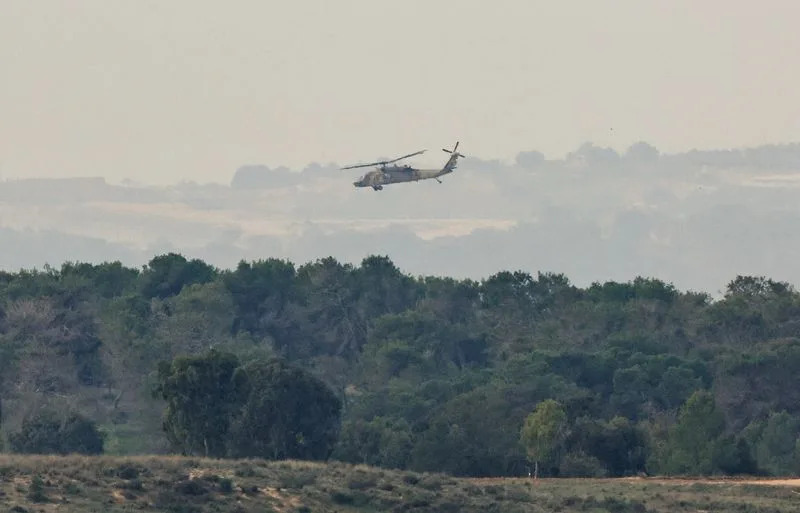Palestinians seek slivers of safety as Israel battles Hamas in south Gaza city

Israel battled Hamas militants in the Gaza's biggest cities on Thursday and said it had attacked dozens of targets, leaving Palestinians struggling to survive a situation the United Nations described as "apocalyptic".
Gazans crammed into neighbouring Rafah on the border with Egypt on the basis of Israeli leaflets and messages saying that they would be safe in the city. But they remained fearful after an Israeli strike on a house there killed 15 on Wednesday, according to health officials in Rafah.
Israel said on Thursday it had killed a number of gunmen in southern Gaza's largest city, Khan Younis, including two militants who emerged firing from a tunnel, a day after Israeli troops entered the heart of the city. Hamas' armed wing, al-Qassam Brigades, said earlier that combat was fierce.
Palestinian health officials said an Israeli air strike had killed four people in a house in Nusseirat refugee camp in central Gaza Strip overnight and another strike killed two people in Khan Younis on Thursday morning.
Residents in Gaza City in the north reported all-night bombing and fierce gunbattles in Shejaia, east of the centre and the Jabalia refugee camp further north as well as bombing in another district, Sabra.
Israel said it had raided a Hamas compound in Jabalia, killing several gunmen and locating a network of tunnels, a training area and a weapons cache.
In Khan Younis, Israeli forces had encircled the house of Hamas leader Yahya Al-Sinwar, Prime Minister Benjamin Netanyahu said on Wednesday evening.
"His home may not be his castle, and he can escape, but it's only a matter of time before we get him," he said in a video statement.
Khan Younis residents said Israeli tanks had neared Sinwar's home but it was not known whether he was there. Israel has said it believes many Hamas leaders and fighters are holed up in underground tunnels.
Israeli warplanes also bombed targets across the densely populated coastal strip in one of the heaviest phases of the two-month-old war. WAFA, the official Palestinian news agency, said late on Wednesday at least 17 were killed in an Israeli airstrike on a house in Maghazi in Central Gaza.
Qatar-based Al Jazeera Media Network said an Israeli bombardment of Jabalia Camp in northern Gaza killed 22 relatives of its Gaza correspondent Moamen Al-Sharafi.
In Geneva, the U.N. human rights chief said the situation in Gaza was "apocalyptic" with the risk that serious rights violations were being committed by both sides.
Hundreds of thousands of people made homeless in north Gaza during the war were desperately seeking shelter in the few places in the south designated as safe by Israel.
The U.N. humanitarian office said on Wednesday that most of the homeless people in Rafah, about 13 km (8 miles) south of Khan Younis, were sleeping rough due to a lack of tents although the U.N. had managed to distribute a few hundred.
While some aid had entered Gaza from Egypt through the Rafah crossing, the surge in hostilities since a week-long truce collapsed on Dec. 1 was hindering its distribution, the U.N. report said.
Displaced civilians were also fleeing to the desolate area of Al Mawasi on Gaza's southern Mediterranean coast, which Israel has said is safe.
The former Bedouin village lacks shelter, food and other necessities, according to refugee organisations.
"There are no bathrooms. We cannot even wash if we want to pray," displaced Palestinian Enas Mosleh told Al Jazeera television. "It is a completely remote area."
Another Palestinian who fled to Al Mawasi, Ibrahim Mahram, said five families were sharing a tent.
"We suffered from the war of cannons and escaped it to arrive at the war of starvation," he told the network.
"We divide one tomato between all of us."
NEW CEASEFIRE EFFORT AT UN
Israel unleashed its military campaign in response to a surprise Oct. 7 incursion by Hamas fighters who rampaged through Israeli towns, killing 1,200 people and seizing 240 hostages, according to Israel's tally.
So far, 87 soldiers have been killed in combat in Gaza, the Israeli military said.
Figures from Gaza's Health Ministry put the death toll in Gaza at 16,015, including 43 reported by one hospital on Tuesday and 73 by another on Wednesday. But because the ministry has not released casualty figures for all of Gaza since Monday, it was unclear if that toll was comprehensive, and the ministry and the U.N. have said hundreds of people are unaccounted for under the rubble.
As Israel broadened its onslaught after largely taking control of north Gaza last month, Palestinian medics said Gaza's hospitals were overflowing with dead and wounded, many of them women and children, and supplies were running out.
The U.N. said only two hospitals in the north were now admitting patients, down from 24 before the war.
Leaders of the Group of Seven nations including Israel's close ally the United States called for further humanitarian truces "to address the deteriorating humanitarian crisis in Gaza and minimise civilian casualties".
The United Nations Security Council received a UAE-drafted resolution on Wednesday that demanded an "immediate humanitarian ceasefire" with a vote sought on Friday.
A senior Hamas official told Reuters mediators were still exploring opportunities for a truce and reiterated its demand that Israel cease its attacks.
Warning of a "severe risk of collapse of the humanitarian system," United Nations Secretary-General Antonio Guterres on Wednesday invoked rarely used Article 99 of the founding U.N. Charter to push for a ceasefire in a letter to the Security Council.
- Questions and Answers
- Opinion
- Story/Motivational/Inspiring
- Technology
- Art
- Causes
- Crafts
- Dance
- Drinks
- Film/Movie
- Fitness
- Food
- Games
- Gardening
- Health
- Home
- Literature
- Music
- Networking
- Other
- Party
- Religion
- Shopping
- Sports
- Theater
- Wellness
- News
- Culture
- War machines and policy


